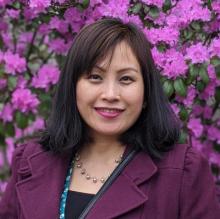With the creation of a Canadian Opera Aria Anthology and her nation-wide recital tour of these works, Stephanie aims to increase the recognition and performance of Canada’s rich operatic culture.
Research Description
The purpose of my research is to create an anthology of soprano arias from operas by Canadian composers and librettists. In addition to the scores, this anthology will also include background information about the operas, as well as interpretive guides built on interviews with the composers and librettists. When looking for contemporary repertoire, singers often perform American arias as many of them can be easily found in American anthology books. In contrast, Canadian arias are rarely performed because they lack in accessibility. My goal with this anthology is to make these Canadian arias available to singers and to educate readers about this wonderful repertoire. Ultimately, I hope that this research will increase the recognition and performance of these wonderful Canadian operatic works.
What does being a Public Scholar mean to you?
Being a public scholar means engaging with the public in a way that makes research accessible to the community. For me, it’s finding a way to contribute to Canadian culture in a meaningful way.
In what ways do you think the PhD experience can be re-imagined with the Public Scholars Initiative?
The world of performance relies heavily on community and public engagement. I feel the DMA is unique in that we are not primarily researchers or academics, but performers at heart. The PSI has helped me push the limits of my research and do things that go beyond the “textbook.” By exploring these unique and unconventional means, I feel I have truly synthesized both my performance and academic passions.
How do you envision connecting your PhD work with broader career possibilities?
We are fortunate to have such an abundant wealth of Canadian operatic works, with new and wonderful pieces constantly being created. For the scope of my thesis, I had to limit the anthology to Soprano but I would love to continue this research in the future and create anthologies for Mezzo-soprano, Tenor, Baritone, and Bass.
How does your research engage with the larger community and social partners?
My research serves a functional purpose as an accessible collection of Canadian arias and interpretive guides for singers’ use in auditions and performances. Its aim is to increase the performance of Canadian opera so that someday, these works may again receive performances on the mainstage. My hope is that my national recital tour will allow me to connect with singers and spark the audiences’ interest in these Canadian operatic works.
Why did you decide to pursue a graduate degree?
I have always loved performing but I discovered that I also love teaching as well. A DMA would allow me to pursue and balance both of my passions.
Why did you choose to come to British Columbia and study at UBC?
I did my undergraduate work at UBC, and to me, this is home. I also wanted to return to UBC to study with my mentor, Prof. Nancy Hermiston. In my mind, there is no one more dedicated and enthusiastic about opera in Canada.
My research serves a functional purpose as an accessible collection of Canadian arias and interpretive guides for singers’ use in auditions and performances".




